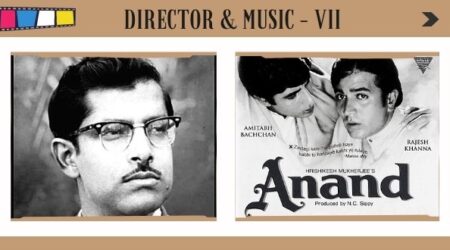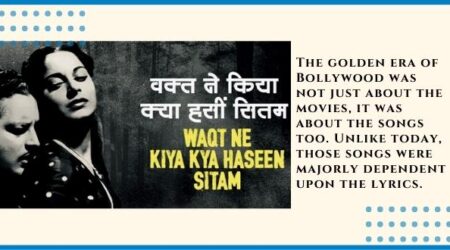Piya Bina Baasiya
Song: Piya bina baasiya – Abhimaan’ 1973
Lyrics: Majrooh Sultanpuri
Music: S D Burman
Singer: Lata Mangeshkar
“Am I supposed to know everything that happens to everyone in this house?”
Ahhh! The fangs of distance penetrate deep into the soul…and a song oozes out…gently…
Pain is tender, pain is sweet, and pain itself is a soulful treat!
Subir leaves the room in a fit of rage, and tears rush to comfort Uma! The guitar strums, the soothing flute begins and lasts just a while, like a synopsis of the beautiful moments they shared and transcends into Lataji’s aalap. And before we know it, Uma knows…he’s gone far away! The strength of love is that it can never change into hate and if at all it does, well; it wasn’t love in the first place! Helplessness is an ornament in love and Uma adorns it with dignity and grace as she elegantly expresses- Piya bina baasiya baaje na.
Without his love, which came like an enchanting breeze, the flute of life just doesn’t play…not even a single note, forget a melodious tune! Sacrifice is indeed a conveniently presumed aspect of love, but when accompanied with compulsion, it becomes an inconveniently obvious flaw.
The song progresses to the first interlude, the violins play an ascending phrase (aarohi) and the camera descends…putting Uma behind bars! Those microphones- her source of reaching out to her countless fans- seem like the bars of a prison! Her flight as a singer has been juxtaposed with her plight as a wife, with unparalleled finesse. She has made her presence felt in the world of music but has lost herself against his absence, and pain has emerged… victorious…yet again! The flute and taar-shehnai then take us to the stanza (antara) – Piya aise roothe, ke hothon se mere sangeet chhoota. Lataji’s variation on ‘roothe’ in the repetition is as soul-stirring as the entire composition! Uma is an exceptional singer, honest to her art, but this situation makes her feel- kabhi jab main gaun, lage mere mann ka har geet jhootha (when I sing in this state of mind, it feels as if every melody of mine is a fake!). So very contrary!
The second interlude ends just like the first and we see Uma behind ‘bars’ again! Tumhari sada bin nahin ek sooni mori nagariya; ke chup hai papiha, mayur bol bhoole bann mein saanwariya. It’s not just her world that’s filled with loneliness; nature has felt the agony too! The cuckoo has gone silent; the peacock has forgotten its call! ‘Love is eternal’, set with such innocence by Majrooh sahab!
One would question the presence of the flute when the lyrics state otherwise, but close observation reveals that the flute pieces have been phenomenally filmed on Subir’s reactions. After all, she believes that life is melodious only due to his love! And he too knows, deep within, that he is taking things too far. What he hasn’t realized though, is that ego is excess baggage…always charged extra! He should ideally be traveling light with just a handbag…full of love!
Majrooh sahab’s lyrics, Burman dada’s composition, and Lataji’s rendition have been beautifully complemented by the music arrangement of this song. Renowned music arrangers Anil Mohile and Arun Paudwal have decorated the stanzas with some of the most enriching obbligatos on the violins.
The eminent Urdu poet, Jigar Muradabadi writes- “Ik lafz-e-mohabbat ka adnaa sa fasaana hai, simte to dil-e-aashiq, phaile to zamaana hai!”
The distinguished Marathi author, VP Kale remarks in his book ‘Partner’- “As you write more and more personal, it becomes more and more universal!”
That is perhaps why a 45-year old song so touches my 6-year old daughter and makes her hum it affectionately! The song is about a personal relation…and is therefore universal!














Comment (1)
Beautifully written sir!